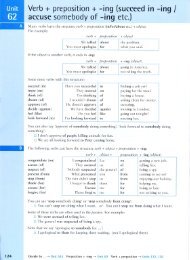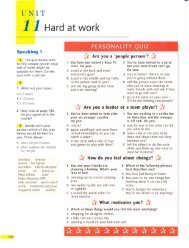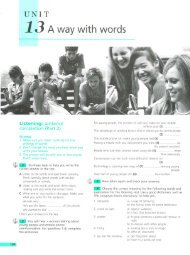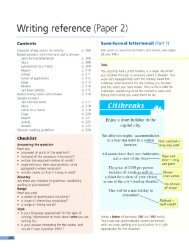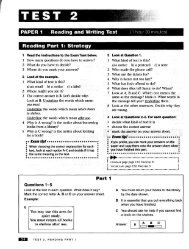I Vo.t are going to hear a news broadcast. Before you listen,look at ...
I Vo.t are going to hear a news broadcast. Before you listen,look at ...
I Vo.t are going to hear a news broadcast. Before you listen,look at ...
Create successful ePaper yourself
Turn your PDF publications into a flip-book with our unique Google optimized e-Paper software.
I<br />
<strong>Vo</strong>.t <strong>are</strong> <strong>going</strong> <strong>to</strong> <strong>hear</strong> a <strong>news</strong> <strong>broadcast</strong>. <strong>Before</strong> <strong>you</strong> <strong>listen</strong>,<strong>look</strong> <strong>at</strong> the<br />
television screens and guess wh<strong>at</strong> the <strong>news</strong> s<strong>to</strong>ries <strong>are</strong>.<br />
E m Listen and check if <strong>you</strong> were right. As <strong>you</strong> <strong>listen</strong>, put the television<br />
screens in the order <strong>you</strong> <strong>hear</strong> the s<strong>to</strong>ries. 1 ........ 2 ........ 3 ........ 4 ........<br />
E W<br />
Listen again and answer these questions. S<strong>to</strong>p the recording when <strong>you</strong> need <strong>to</strong>.<br />
1 Where will the Prime Minister be for the next two days? At-..*....c.pnf.s.f .a.!F.8..in...y:)45hit9tpn,.<br />
3 Wh<strong>at</strong> is Cherry Pickles <strong>at</strong>tempting <strong>to</strong> do?<br />
6 How long will the mo<strong>to</strong>rway remain closed? ..........................<br />
!l root <strong>at</strong> <strong>you</strong>r answers <strong>to</strong> Exercise 3.<br />
1 \Alhich prepositions <strong>are</strong> used in answers about time?<br />
2 \{hich prepositions <strong>are</strong> used in answers about place?<br />
Le2
L Prepositions of place<br />
In, <strong>at</strong> and on<br />
In is used:<br />
I for someone or something inside a limited<br />
<strong>are</strong>a (e.g. a <strong>to</strong>wn, a country, a garden):<br />
The Prime Minister is in Washing<strong>to</strong>n ...<br />
... she still intends <strong>to</strong> be in Chile ...<br />
There <strong>are</strong> some louely trees in this garden.<br />
I for someone or something inside a<br />
building, room, or container:<br />
... <strong>hear</strong>d shouting in the manager's office.<br />
Do <strong>you</strong> leeep <strong>you</strong>r credit cards in this wallet?<br />
On is used:<br />
I for a point on a fixed line (e.g. a road,<br />
the coast):<br />
... Napier, on the west coast ...<br />
They were called <strong>to</strong> the banle on the<br />
High Street.<br />
I for a point on a surface:<br />
... Christchurch, on the south island ...<br />
There's a hoole on the wall for co<strong>at</strong>s.<br />
s withfloor and ceiling:<br />
There's a spider on the ceiling.<br />
r for public transport vehicles, such as buses,<br />
trains or planes:<br />
They met on a plane.<br />
I can't read on the bus.<br />
A but we use in for cars and taxis:<br />
He came home in a taxi.<br />
At is used:<br />
r when we think about a place in terms of its<br />
function or as a meeting place:<br />
... then haue talles <strong>at</strong> the White House.<br />
I 'leeep my tennis racket <strong>at</strong> the sports club,<br />
I'll see <strong>you</strong> <strong>at</strong> the the<strong>at</strong>re,<br />
r for an event:<br />
He will remain q.t the conference ,..<br />
There were a lot of strangers q.t the party,<br />
Across and oaer<br />
There <strong>are</strong> many places where either &cross or<br />
ouer canbe used:<br />
... a footbridge across / ouer the mo<strong>to</strong>rway ...<br />
but comp<strong>are</strong>:<br />
Their eyes nxet across the table.<br />
... her &ttempt <strong>to</strong> sail alone across the Pacific.<br />
across \<br />
The children climbed oaer the wall.<br />
over<br />
,'ff\<br />
rUl<br />
rur<br />
rliffir<br />
r@l<br />
rHllr<br />
rffil<br />
-.' ffi<br />
t'*<br />
Aboae and ouer<br />
Aboue or ouer is used if one thing is higher<br />
than another:<br />
The worleshop is aboae / oaer the garage.<br />
Ouer is used when one thing covers another:<br />
Put this rug oaer th<strong>at</strong> old chair.<br />
Aboue is used when the two things <strong>are</strong> not<br />
directly on <strong>to</strong>p of each other:<br />
The hotel is aboae the beach.<br />
Aboue is used in documents:<br />
Please don't write aboae the line.<br />
183
andq andbelow<br />
Under or below is used if one thing is lower<br />
than another:<br />
The garage is below / uniler the worLeshop.<br />
Under is the opposite of ouer:<br />
There's a beautiful old chair under th<strong>at</strong> rug.<br />
Below is the opposite of aboue:<br />
The beach is belout the hotel.<br />
Below is used in documents:<br />
Please don't write below the line.<br />
Along andtlwough<br />
Along is used for something which follows<br />
a line:<br />
We strolled along the riuerbank <strong>at</strong> dusle.<br />
There were cheering uowds along the route of<br />
the procession.<br />
ta.----r'<br />
along<br />
Through means from one side of something<br />
<strong>to</strong> the other side of it:<br />
The mo<strong>to</strong>rwey pesses through Birmingham.<br />
I struggled through the crowd <strong>to</strong> reach a<br />
telephone.<br />
We could see the sea th.rough the trees.<br />
through<br />
By andbesiile<br />
By can be used in the same way as beside,<br />
meaning'next <strong>to</strong>':<br />
... a security man standingby /besid.e the door<br />
of the bank ..,<br />
I'd loue <strong>to</strong> liue by / besiile a lalee.<br />
Between and an<strong>to</strong>ng<br />
Between is used when we talk about two<br />
places, things or people:<br />
The dictionary is between the grammar boole<br />
and the <strong>at</strong>las.<br />
... the mo<strong>to</strong>rway between London and Oxford ...<br />
Among is used <strong>to</strong> identify something as part<br />
of a group:<br />
Is there a dictionary somewhere a.rnong<br />
these booles?<br />
w;t( 5<br />
t'rl'! -1! *<br />
;l<br />
2 Prepositions of time<br />
At, on andin<br />
Ar is used:<br />
c for a point of time:<br />
... <strong>at</strong> the start of her ettennpt <strong>to</strong> sail alone<br />
across the Pacific.<br />
r' for the time of day:<br />
<strong>at</strong> six o'clock, <strong>at</strong> dawn, <strong>at</strong> lunchtime<br />
I for seasonal holidays:<br />
<strong>at</strong> Christmas, <strong>at</strong> Easter<br />
r for the following expressions:<br />
<strong>at</strong> the weekend, <strong>at</strong> first, <strong>at</strong> lest, a.t present<br />
(= now), a.t the moment (= now), <strong>at</strong> times<br />
(= sometimes), <strong>at</strong> once (= immedi<strong>at</strong>ely)<br />
On. is used for d<strong>at</strong>es and days (including<br />
special days):<br />
on Monday, on 3rd December (note th<strong>at</strong> we<br />
say: on the third of December), on New Year's<br />
Day, on Christmas Day, on my wedding<br />
anniversary<br />
In. is used for all or part of a period of time:<br />
in the afternoon, 'in winter, in the twenty-first<br />
century, in the Middle Ages<br />
By andu.ntil<br />
By means th<strong>at</strong> something happens not l<strong>at</strong>er<br />
than, and possibly before, the time mentioned:<br />
,.. she sill intends <strong>to</strong> be in Chile by the end<br />
of the year. (= <strong>at</strong> the end of the year, or<br />
possibly before)<br />
Can we finish this worle by four o'clocle? (= not<br />
l<strong>at</strong>er than four o'clock)<br />
Until means th<strong>at</strong> something continues up <strong>to</strong>,<br />
but not l<strong>at</strong>er than, the time mentioned:<br />
,,. part of the mo<strong>to</strong>rway will remain closed until<br />
this afternoon. (= it will open this afternoon)<br />
Until is often used with a neg<strong>at</strong>ive, meaning<br />
'not before':<br />
We can't e<strong>at</strong> until all the guests arriue. (= we<br />
can e<strong>at</strong> when they <strong>are</strong> all here)<br />
In, ihning andfor<br />
In and d"rirg <strong>are</strong> often used with the same<br />
meaning:<br />
In / During the summer we often go for<br />
long walles.<br />
bu duri.ng shows a particular event against<br />
the background of a period of time:<br />
The manager was released ihning the night ...<br />
especially if it is an interruption:<br />
They walleed out of the hall il.uring the speech.<br />
For shows how long something lasts:<br />
He will remain <strong>at</strong> the conference for two days ,..<br />
We went <strong>to</strong> Spainfor the summer.<br />
In shows how soon something happens:<br />
In less than an hour we had <strong>hear</strong>d all about<br />
his aduentures.<br />
I'll meet <strong>you</strong> in ten minutes.<br />
185
,'l II<br />
I<br />
Sutu is on the train and she's phoning her friend Rebecca. Complete<br />
the convers<strong>at</strong>ions with the prepositions in the box.<br />
<strong>at</strong> ai"": bi"":':by du1i*g: 'furl in in ger .over until<br />
In Rebecca's office, 11.30 am.<br />
Rebecca: RebeccaWhite.<br />
Sara:<br />
the st<strong>at</strong>ion?<br />
Rebecca: Wh<strong>at</strong> time?<br />
Sara: Three.<br />
Rebecca: I think so. The car's got a puncture. If I can arrange <strong>to</strong> get it fixed<br />
(3) my break, I'11be there.<br />
Sara: Thanks, th<strong>at</strong>'s gre<strong>at</strong>.<br />
At the g<strong>are</strong>ge, 1.40 pm.<br />
Rebecca: Can <strong>you</strong> fix this puncture for me?<br />
Mechanic: Yes, probably. But my assistant won't be back from lunch .... ...... ..... (4)<br />
half an hour and I'11be working on this other job .................. (5) then.<br />
Rebecca: Well, I've got <strong>to</strong> collect someone from the st<strong>at</strong>ion (6) three.<br />
Mechanic: Oh, th<strong>at</strong>'s no problem. We'll have it done ............ (7) half past<br />
two easily.<br />
Rebecca: Thanks. I'llbe back ............. . . (8) an hour, OK?<br />
Mechanic: Fine. See <strong>you</strong> then.<br />
On the tain, 2.L0 pm.<br />
Sara: Hello?<br />
Rebecca: The car's being fixed now. I'll wait for <strong>you</strong> (9) the<br />
main door of the st<strong>at</strong>ion, so I can help carry <strong>you</strong>r stuff.<br />
Sara:<br />
Don't worry. I haven't got anything heavy. I'11 see <strong>you</strong> ...................... (10)<br />
the car park. It's just ................ .. (11) the footbridge, isn't it?<br />
Rebecca: Yes, all right. See <strong>you</strong> there.<br />
Sara: Bye.<br />
186
ll<br />
Eiff in the gaps in this postcard with suitable prepositions.<br />
Dear fthiarrnon,<br />
How^<strong>are</strong> .pu? l'^^ eryoyirrl thir trip <strong>to</strong> Corrrwall.<br />
........n-T-....... (1) the xoraert, we're stayia4<br />
(2) tla. pretty little <strong>to</strong>u of 3t lver<br />
(3) the north coart. T\ere <strong>are</strong> lotr of<br />
arl. lalleries (4) the <strong>to</strong>wn, 5o h,e vitit<br />
or.e of thel^ each raorrin4 ard ther ..............,.,.... (5)<br />
the afterrroo^ r^€.<br />
,o <strong>to</strong> the beach ..................... (6)<br />
ar hol,rr or two. (7) the h€eke^d, r^,e<br />
plar <strong>to</strong> drive <strong>to</strong> tlre routh coait. Frou tlere tre'll<br />
Oy <strong>to</strong> the
-)'<br />
I<br />
lr<br />
I<br />
e hotel owner is showing some visi<strong>to</strong>rs round his new premises. Fill in<br />
the gaps with suitable prepositions.<br />
We're now standing .........1t1)......... (1) the lounge, a beautiful room, with paintings<br />
(2) the ceiling and a wonderful view ............. (3) the park <strong>to</strong> the hills<br />
(4) it.The cellar is being decor<strong>at</strong>ed (5) present, but we will<br />
open it as a restaurant .............. (6) a few months' time. ............ . . (7) then we <strong>are</strong><br />
serving meals (8) the dining-room only.<br />
Do <strong>you</strong> see the trees planted all<br />
door? They <strong>are</strong> <strong>going</strong> <strong>to</strong> be hung with coloured lights<br />
occasions. If we go<br />
(9) the sides of the road up <strong>to</strong> the front<br />
(10) special<br />
(11) th<strong>at</strong> g<strong>at</strong>e, we'll reach the rose garden, where <strong>you</strong><br />
can see a number of interesting sculptures on display . . ... ... (12) the bushes.<br />
188
Use of English<br />
For questions 1-15, read the text below and <strong>look</strong> c<strong>are</strong>fully <strong>at</strong> each line. Some of<br />
the lines <strong>are</strong> correct, and some have a word which should not be there. lf a line is<br />
correct, put a tick (/). |'f a line has a word which should not be there, write the<br />
word. There <strong>are</strong> two examples <strong>at</strong> the beginning (O and O0).<br />
A DAY OUT<br />
0<br />
00<br />
L<br />
2<br />
3<br />
4<br />
5<br />
6<br />
7<br />
8<br />
9<br />
10<br />
LL<br />
L2<br />
13<br />
L4<br />
15<br />
We visited an arts centre on the road between Salisbury and<br />
Winchester last week. lt used <strong>to</strong> be on a farm and the new<br />
owners have made the clever use of some old barns, stables<br />
and other buildings. There <strong>are</strong> several small studios of which<br />
can be rented so cheaply by local painters, sculp<strong>to</strong>rs, potters and<br />
other artists <strong>to</strong> work in. The barn has been turned in<strong>to</strong> a most<br />
<strong>at</strong>tractive designed gallery. The current exhibition has some lovely<br />
modern glass from Scotland. The gallery is used <strong>to</strong> show of the<br />
work of the artists who use the studios in addition <strong>to</strong> holding<br />
exhibitions by more than famous artists from other parts of the<br />
country. Most of all the artists were in their studios when we<br />
visited th<strong>at</strong> and we were able <strong>to</strong> talk <strong>to</strong> them about wh<strong>at</strong><br />
occup<strong>at</strong>ions they were doing. One potter <strong>to</strong>ld us th<strong>at</strong> it can<br />
be quite a lonely job <strong>at</strong> some times, so she is happy<strong>to</strong> be in a<br />
place where she feels she is among people who understand her<br />
work. They can go across the yard for have coffee and a ch<strong>at</strong><br />
and sh<strong>are</strong> their problems one with each other.<br />
189
,'l lt<br />
After <strong>you</strong> have checked <strong>you</strong>r :rnswers <strong>to</strong> the exam task, read the text c<strong>are</strong>fully<br />
once more. Then fill in ih" gaps with the correct prepositions without <strong>look</strong>ing<br />
back <strong>at</strong> *le text.<br />
' '.r.i,r''<br />
1 The arts centre is .........911........ the road Salisbury and Winchester.<br />
2 The ar--------------tists,.were ,,.,.................... their s6digs,,wh*lre yi$ : : :<br />
+ She.,iai ,.'ghs vy<strong>at</strong>'',tnppy <strong>to</strong> be .......::.::.......... people whq unders<strong>to</strong>odl'lh ,,,*ork.<br />
5 The,,artists go --..,.1,.1,1,,.,. th€ yard for,coffee. , .,.,,<br />
Writing<br />
Your family is exchanging homes with some English friends for a fortnisht's holiday. Your<br />
English friends have visited <strong>you</strong>r country before, but they have not been <strong>to</strong> <strong>you</strong>r <strong>are</strong>a. You<br />
decide <strong>to</strong> leave a letter telling them about places <strong>to</strong> visit and when they <strong>are</strong> open. Write<br />
a letter in 12O-18O words in an appropri<strong>at</strong>e style. Do not write any addresses.<br />
This task gives <strong>you</strong> a chance <strong>to</strong> practise:<br />
using prepositions for places and times.<br />
Useful words and expressions<br />
bar*, gl@ hcal s@a'' rn*ann,t sfw' '' *U, wp* i, swhnming pool<br />
in the (ciry) cmte, iust up tlw roa.d, not far from, on thc outshirts<br />
&t weekends, on weekda.ys<br />
190
!| <strong>Vo</strong>" <strong>are</strong> <strong>going</strong> <strong>to</strong> <strong>hear</strong> a man called Andy telling his wife, Dawn, about a fire.<br />
<strong>Before</strong> <strong>you</strong> <strong>listen</strong>, <strong>look</strong> <strong>at</strong> the pictures. Wh<strong>at</strong> is happening in each one?<br />
E Wl,isten<br />
and decide which picture best fits wh<strong>at</strong> Andy tells Dawn. Wh<strong>at</strong> is wrong<br />
E m Listen again and fill in the gaps.<br />
1 ... wh<strong>at</strong>'s happened ...1q............... <strong>you</strong>r jacket?<br />
2 ... there's no need <strong>to</strong> shout ...................... me.<br />
3 ... an adventure the way home.<br />
4 I called the fire brigade my mobile ...<br />
5 I got in ...................... breaking a window.<br />
6 ... smashed a window ...................... hitting it ...<br />
7 I covered my face a handkerchief.<br />
8 You could have been real danger.<br />
9 ... the fire brigade were ...................... control ...<br />
10 ... they thanked <strong>you</strong> saving their property.<br />
I<br />
1'1, ... do <strong>you</strong> forgive me ...................... being l<strong>at</strong>e?<br />
1.2 | can't be angry <strong>you</strong> now.<br />
13 I'll make a really nice supper ...................... <strong>you</strong>.<br />
14 l'm <strong>look</strong>ing forward e<strong>at</strong>ing it ...<br />
foot <strong>at</strong> <strong>you</strong>r answers <strong>to</strong> questions 5 and 6 in Exercise 3. Which preposition is used <strong>to</strong><br />
show how something is done?<br />
191
L Prepositions which follow verbs and adjectives<br />
Verb + preposition<br />
Some verbs <strong>are</strong> nearly always followed by a particular preposition.<br />
These include:<br />
. approue of She doesn't q+rproae of smoleing.<br />
s mquire about: We enquireil about our hotel reseru<strong>at</strong>ion.<br />
s insist on: My boss iruisrs on not hauing plants in the office.<br />
t lo ok forward <strong>to</strong> : I'm r eally <strong>look</strong>ing forutaril <strong>to</strong> e <strong>at</strong>ing it.<br />
t succeed in: Did <strong>you</strong> succeeil in finding accommod<strong>at</strong>ion?<br />
Notice th<strong>at</strong> prepositions <strong>are</strong> followed by a noun or by the -ing form:<br />
We enquired about booking a room.<br />
We enquired about our hotel reseru<strong>at</strong>ion.<br />
Verb + object + preposition<br />
Some verbs <strong>are</strong> nearly always followed by an object and a particular<br />
preposition. These include:<br />
. &ccuse someone of: They accused. the gbl of taking the parcel.<br />
. congr<strong>at</strong>ul<strong>at</strong>e someone on: He congr<strong>at</strong>ul<strong>at</strong>ed. me on passing the exam.<br />
t forgiue someone for: She can't forgiue th<strong>at</strong> rnan for all the lies he <strong>to</strong>ld.<br />
. preuent someone / sonxething (from): I t'ried <strong>to</strong> preaent the box (fro*)<br />
slipping off the se<strong>at</strong>.<br />
. suspect someone of: I suspect her of being dishonest.<br />
Verb + different prepositions<br />
Some verbs <strong>are</strong> followed by different prepositions, which change the<br />
meaning. These include:<br />
. egree with someone and agree about something:<br />
I quite a.gree with <strong>you</strong>, I thinle <strong>you</strong>'re right. (= a person)<br />
My f<strong>at</strong>her and I d.on't agree about politics. (= n subject)<br />
c ask for something and ask about something:<br />
He askeil me for some money. (= he requested)<br />
She asked me about rny plans for the summtr (= she enquired)<br />
e laugh about and laugh <strong>at</strong>:<br />
I was l<strong>at</strong>e but he wasn't an{!, he just laugheil about it. 1= lonn4 it funny)<br />
I can't wear this h<strong>at</strong>. Everyone willlau.gh a.t me. (= made fun of - unkindly)<br />
L92
think of and think about:<br />
Wh<strong>at</strong> do <strong>you</strong> think of my new jacleet? It's gre<strong>at</strong>. (= wh<strong>at</strong> is <strong>you</strong>r opinion?)<br />
Wh<strong>at</strong> <strong>are</strong> <strong>you</strong> thinleing about? Lunch - I'm hungryl (= wh<strong>at</strong> is in<br />
<strong>you</strong>r mind?)<br />
throw <strong>at</strong> and throw ro (also shout <strong>at</strong> / point <strong>at</strong> and shout <strong>to</strong> / point <strong>to</strong>):<br />
The little boy threw the ball <strong>to</strong> his f<strong>at</strong>her. (= part of a game)<br />
Don't throw <strong>to</strong>ys <strong>at</strong> <strong>you</strong>r sister, Harry, <strong>you</strong> might hurt her. (= probably angry<br />
or rude)<br />
To be + adjective + preposition<br />
Some adjectives <strong>are</strong> nearly always followed by a particular preposition.<br />
These include:<br />
. engry about (something); Sha's engry about the theft of her purse.<br />
. angry with (someone): He's uery qngry with his assistant.<br />
s good /bad <strong>at</strong> (something): She's gooil <strong>at</strong> drawing fTowers.<br />
s pleased about (something): My p<strong>are</strong>nts uteren't Ttleased about rny bad report.<br />
t pleased with (something or someone): Granny was uery gileased. with the boole<br />
<strong>you</strong> sent her.<br />
s rude / polite <strong>to</strong> (someone): Don't be rude <strong>to</strong> anyone <strong>at</strong> the party.<br />
t (un)leind <strong>to</strong> (sorneone): The children were extemely unleinil <strong>to</strong> the new boy.<br />
2 Prepositions used <strong>to</strong> expreas who, how and why<br />
By, with and for<br />
We use by vith passive verbs, for the person or thing which does the action:<br />
The window was srnashedby Anily.<br />
The fire was startedby an electricalfaub.<br />
We use by * -ing <strong>to</strong> show how something is done:<br />
He smashed the window by hitting it with a hammer.<br />
He got inbybreaking a window.<br />
We use with + noun for a <strong>to</strong>ol (or other object):<br />
He smashed the window with aham.mer.<br />
He couered his face with his handkerchief.<br />
We use/or + -ing or a noun <strong>to</strong> explain the purpose of a <strong>to</strong>ol or other object:<br />
Hammers <strong>are</strong> norrrually for lenocking in nails, not for smashing windows!<br />
He leeeps a bag of <strong>to</strong>ols in his car for emergencies.<br />
We can also usepr + -ing or a noun <strong>to</strong> explain the reason for something:<br />
The owners of the house thanLeed himfor sailng their property.<br />
He received an award for bra.ntery.<br />
rg3
*)* )<br />
-__J<br />
l<br />
3 Expressions with prepositions<br />
We use prepositions in the following fixed expressions:<br />
. ways of travelling:<br />
by air, by plane, by road, by car, by bus, by rail, by trainbtt on foot<br />
. ways of contacting people:<br />
by post, by email, by phonebut <strong>to</strong> be on the phone (= using the phone)<br />
. ways things can happen:<br />
by chance, by accident, by mistalee but on purpose<br />
a reasons for being somewhere:<br />
on holiday, on / off duty, on business<br />
e circumstances:<br />
in love, in secret, in priu<strong>at</strong>e, in public, in / out of sight, in / out of debt,<br />
in / out of danger, in / out of dfficuhies, in a hurry, in a temper, 'in control,<br />
in charge of, <strong>at</strong> peace, a.t w&r, <strong>at</strong> woile, <strong>at</strong> horne<br />
A Don't make mistakes with these expressions:<br />
s <strong>at</strong> least and <strong>at</strong> last:<br />
Th<strong>at</strong> bilee must haue cost <strong>at</strong> least five hundred pounds. (= not less than)<br />
The worle <strong>to</strong>ok a long time but <strong>at</strong> last it was finished. (= finally)<br />
t on the way and in the way:<br />
I'm <strong>going</strong> <strong>to</strong> my office so I'll call and see <strong>you</strong> on the way. (= between two<br />
points on a journey)<br />
I can't nxoue the table because th<strong>at</strong> chair's in the wW. G blocking a p<strong>at</strong>h<br />
between two obiects / people)<br />
s on time and in time:<br />
If the train's on time, I'll be home <strong>at</strong> six. (= punctual)<br />
If we leaue now, we'll be home in time <strong>to</strong> see the <strong>news</strong>. (= <strong>at</strong> or before<br />
the correct time)<br />
a in the end and <strong>at</strong> the end:<br />
She didn't want <strong>to</strong> come with us, but in the enil we persuaded her.<br />
(= the final result)<br />
It was a gre<strong>at</strong> show and the audience applauded loudly <strong>at</strong> the enil.<br />
(= the last thing <strong>to</strong> happen)<br />
. <strong>to</strong> be the mqtter with and <strong>to</strong> be about:<br />
Wh<strong>at</strong> was the m<strong>at</strong>ter with Lesley? W was she upset?<br />
(= something wrong)<br />
Wh<strong>at</strong>'s th<strong>at</strong> boole about? (= subject)<br />
c <strong>to</strong> be in charge of and <strong>to</strong> be responsible for:<br />
He's in charge of the office and makes all the important decisions,<br />
(= he's the boss)<br />
I'm responsible for trauel arrangements, but not accommod<strong>at</strong>ion.<br />
(= it's my duty)<br />
Lg4
I<br />
mit" sentences describing wh<strong>at</strong> happened in each of the pictures, using the words glven.<br />
Can <strong>you</strong> tell me wh<strong>at</strong> trains there <strong>are</strong> <strong>to</strong> Scotland?<br />
(enquired)<br />
te..en#ys4...*hrl..tr..*in.s-..Jp...9..ss11*n4.,.......................<br />
Well done! You certainly deserved <strong>to</strong> win this <strong>to</strong>urnament.<br />
(congr<strong>at</strong>ul<strong>at</strong>ed)<br />
No, <strong>you</strong> can't come in here.<br />
(preuented)<br />
4<br />
I'm so sorry I forgot <strong>to</strong> phone <strong>you</strong>.<br />
It's OK, I'm not angry.<br />
ffiffi(rorgaue)<br />
You've been reading my diary!<br />
(accused)<br />
No, I didn't either.<br />
195
E<br />
t" eight of these sentences there is <strong>at</strong> least one wrong preposition.<br />
Underline each mistake and write the correction.<br />
1 Yoo know gou shooldn't phone rne rl wonki ..................*1...q{d!.<br />
2 Yvonnedoesn'f opprove on wecning recl fun bof Ido doesn't cgnee fo hen<br />
3 Who is nesponsible of setfing the bcrnglon olonrn?<br />
4 I osked the rnoncgen of ocJvice for fnoining but he jusf shooted ongnilg with rne fon distunbing hirn<br />
5 Jornie ond Pio wene bnoltghf <strong>to</strong> fhe fheofne bg thein ponents.<br />
6 The rnenrnoid wos cornbing hen horn bg o silver cornb. ............<br />
7 No one's hod ong coke. Whot's the rnotten of itp .............<br />
9 Do gou know the nonre of the thing go0 Lrse fon opening wine bottles? ......................<br />
10 Monco didn'f undensfond whct the plog wos in becoctse fhene wos o pillon on the wog so<br />
p fiff in the gaps in these <strong>news</strong>paper articles with suitable prepositions.<br />
The wedding <strong>to</strong>ok place last S<strong>at</strong>urday of a<br />
couple who fell ..........1n........ (1) love<br />
through the internet. Penny and Peter<br />
communic<strong>at</strong>ed ...................... (2\ email for<br />
six months until they discovered<br />
(3) accident th<strong>at</strong> they worked<br />
(4) the same building.<br />
Acnrally I had noticed her before and<br />
liked her, but I was <strong>to</strong>o shy <strong>to</strong> speak <strong>to</strong> her<br />
(5) public,' said blushing<br />
Peter. 'When I realised she was my<br />
internet friend, <strong>at</strong> first I suspected her<br />
(5) laughins ...................... (7)<br />
me, and I was quite angry ............. (8)<br />
it. But luckily she succeeded .... .... ............ (9)<br />
persuading me th<strong>at</strong> I was wrong. Now<br />
we'rc <strong>look</strong>ing forward ...................... (10)<br />
spending our lives <strong>to</strong>gether.'<br />
196
A FBENCH BANK ROBBER WAS<br />
rrested yestetday """"""""""" (1)<br />
faioUntift, two Years<br />
-ftq Pt<br />
.ti*". "a former cashigl<br />
......'...- (2)<br />
recognised him """"'<br />
.fl*""" in the hotel where she<br />
**<br />
"""""-'- "'-"- (3)<br />
""yt"g<br />
business and rePoted him.<strong>to</strong> '<br />
,rt" r""*ltY guard """"' (4)<br />
J.rty. ttt" guard accused him<br />
c{<br />
I<br />
I<br />
An elderly brother and<br />
sister were reunited <strong>to</strong>day<br />
and their papers were<br />
lost, Cecil's granddaughter<br />
of them never returned.<br />
When I thought l'd found<br />
for the first time since they<br />
began trying <strong>to</strong> find Freda<br />
Freda, I wanted <strong>to</strong> tell Dad<br />
were children. Freda and<br />
Cecil Brown's p<strong>are</strong>nts had<br />
five years ago. 'lt was hard,<br />
but ...................... (4) last I<br />
immedi<strong>at</strong>ely, but I decided<br />
<strong>to</strong> meet her ...................... (7)<br />
been ...................... (1) debt<br />
and the children had been<br />
put in children's homes<br />
until their family was<br />
(2) difficulties.<br />
But the country was<br />
(3) war, the<br />
found the daughter of the<br />
woman who had been<br />
(5) charge of<br />
the home where Freda was.<br />
She said th<strong>at</strong> some of the<br />
girls were sent <strong>to</strong> Canada<br />
<strong>to</strong> be .............. (6) danger<br />
secret first, in case I was<br />
wrong, But I was right.'<br />
Two days ago, Cecil<br />
travelled (8)<br />
air for the first time<br />
(e) his life.<br />
'We've got a lot of c<strong>at</strong>ching<br />
children were separ<strong>at</strong>ed,<br />
during the war and many<br />
up <strong>to</strong> dg' he said.<br />
L97
-)-) lr<br />
k.,r,ii{'rq:*,,,!!:r,,<br />
r,1,1;;,.',,,,.,.t..<br />
Use of English<br />
For questions 1-10, read the text below. Use the word given in capitals <strong>at</strong> the<br />
end of each line <strong>to</strong> form a word th<strong>at</strong> fits in the space in the same line. There is<br />
an example <strong>at</strong> the beginning (O).<br />
Anr tasktests<br />
&a{rrqql'&om the<br />
,, ,r,iest 6f'the book<br />
r:r. a.6 w*ll as the<br />
'r- gqlnmar in<br />
"'.,.'::'r.'r,lr<br />
'iihis..unii;<br />
THE CLOTHES WE CHOOSE TO WEAR<br />
The clothes we wear can be a form of (o) .99nn*ff*:t...'-o..h. Clothes, like a<br />
(1) ......... ......... language, give out a message. This can be very simple, for example,<br />
when we wear clothing for keeping warm, or perhaps <strong>to</strong> <strong>at</strong>tend a (2) ........... .. .<br />
ceremony, announce our (3) views or just <strong>look</strong> sexy. lt isn't always<br />
this simple, however. (4) . ..................., ?s with speech, our reasons for making<br />
any st<strong>at</strong>ement have a (5) ...................... <strong>to</strong> be double or multlple. The man who<br />
buys an expensive co<strong>at</strong> may simultaneously want it <strong>to</strong> offer (6) .......... ....... from<br />
bad we<strong>at</strong>her, and magically surround him with the qualities of an (7) . ..............<br />
film star. (8) ..................., people r<strong>are</strong>ly succeed in s<strong>at</strong>isfying both these requirements<br />
<strong>at</strong> once. Even (9) both these st<strong>at</strong>ements could actually be made by<br />
one single co<strong>at</strong>, this (10) ..................... item of clothing may not be available,<br />
and if it is, we may not be able <strong>to</strong> afford it.<br />
COMMUNICATE<br />
SPEAK<br />
GRADUATE<br />
POLtTTCS<br />
FORTUNE<br />
TEND<br />
PROTECT<br />
NATION<br />
NATURE<br />
SUPPOSE<br />
IDEA<br />
1<br />
2<br />
3<br />
4:<br />
5<br />
6<br />
t98
Writing<br />
Last weekend <strong>you</strong> went <strong>to</strong> Northwold for a short winter break. When <strong>you</strong> arrived <strong>you</strong><br />
discovered th<strong>at</strong> a number of the <strong>to</strong>wn's <strong>at</strong>tractions were not available. Your travel agent<br />
had not warned <strong>you</strong> about this. Look <strong>at</strong> the inform<strong>at</strong>ion in the brochure and the notes<br />
<strong>you</strong> made and write <strong>to</strong> the travel agent, telling him why <strong>you</strong>r weekend was not as<br />
enjoyable as <strong>you</strong> had hoped and asking for compens<strong>at</strong>ion.<br />
dl true -<br />
would go<br />
l<br />
The Star Hotel, Northwold<br />
The Star is a troditional hotel.<br />
I Our friendly ond efficient s<strong>to</strong>ff,<br />
l) comfonoble rooms ond<br />
a-qain<br />
\ excellent res<strong>to</strong>uront ore<br />
\ guoranteed <strong>to</strong> help <strong>you</strong> enjoy<br />
\ <strong>you</strong>r time in Northwold.<br />
Northwold<br />
The old <strong>to</strong>wn of Northwold, with its hill-<br />
winding<br />
streets, is fun <strong>to</strong> explore. There <strong>are</strong> numerous antique shops and<br />
two qrt galleries as well as several <strong>at</strong>tractive caf6s and tea shops.<br />
offers a varied programme suitable for all<br />
the family.<br />
in an <strong>at</strong>tractive park, where<br />
tennis courts can be hired by the hour.<br />
c-asie shut wee.kerrds<br />
most dosel<br />
summet only<br />
b,.rt it s oufdoor,<br />
"nl.rot"ll<br />
Write a letter in 120-180 words in an appropri<strong>at</strong>e style. Do not write any addresses.<br />
This task gives <strong>you</strong> a chance <strong>to</strong> practise:<br />
describing wh<strong>at</strong> <strong>you</strong> did and wh<strong>at</strong> <strong>you</strong> could not do. :<br />
describing how <strong>you</strong> felt.<br />
using expressions with prepositions.<br />
Useful words and expressions<br />
<strong>to</strong> dttise, <strong>to</strong> ett:pect, ta <strong>look</strong> forward. <strong>to</strong>, <strong>to</strong> tecaflwnmd, ta be resportsible for,''<strong>to</strong>.warn<br />
annoye il, dctighte d" disapp ointe d, sotisfied" u.p s et<br />
thc broclrure sai.d th<strong>at</strong> ..., however<br />
199
I<br />
<strong>Vo</strong>.r <strong>are</strong> <strong>going</strong> <strong>to</strong> <strong>hear</strong> a man showing some visi<strong>to</strong>rs round the castle where he lives.<br />
<strong>Before</strong> <strong>you</strong> <strong>listen</strong>, <strong>look</strong> <strong>at</strong> each picture.<br />
Can <strong>you</strong> guess when the people lived?<br />
Do <strong>you</strong> think they <strong>are</strong> members of the same family?<br />
E m Listen and check if <strong>you</strong> were right. As <strong>you</strong> <strong>listen</strong>, m<strong>at</strong>ch the names <strong>to</strong> the pictures.<br />
1 Marg<strong>are</strong>t ........ 2 Edmund........ 3 Henry ........ 4 William ........ 5 Jane<br />
........<br />
E m Listen again and complete the answers <strong>to</strong> these questions. S<strong>to</strong>p the recording<br />
when <strong>you</strong> need <strong>to</strong>.<br />
1 Wh<strong>at</strong> do we learn about the ship in the picture of Edmund?<br />
It'stheone.W.h.'-c.h..k...w*s....e*pJ*n...9f...d$ri!g...*..f,*rnp*:...n*-V.4!...yj9J.9.r..y<br />
2 Which is the picture of Henry and William?<br />
It's the picture<br />
3 How do we know who William is?<br />
4 Which side did Henry support in the Civil War?<br />
lt was the side<br />
5 Which year was the picture of Jane and her children painted?<br />
I<br />
Unaertine the first word in each of <strong>you</strong>r answers <strong>to</strong> Exercise 3. They <strong>are</strong> all words which<br />
can introduce rel<strong>at</strong>ive clauses. Wh<strong>at</strong> does each word refer <strong>to</strong>?<br />
1 ...................... 2 ...................... 3 ...................... 4 ...................... 5 ......................<br />
200
L Defining rel<strong>at</strong>ive clauses<br />
Defining rel<strong>at</strong>ive clauses tell us some<br />
essential inform<strong>at</strong>ion about the things or<br />
people they refer <strong>to</strong>:<br />
The picture th<strong>at</strong> hangs nefr <strong>to</strong> Marg<strong>are</strong>t's<br />
portrait is the one I liLee best.<br />
If we remove the words th<strong>at</strong> hangs next <strong>to</strong><br />
Marg<strong>are</strong>t's portait we don't know which<br />
picture Jasper is talking about.<br />
Defining rel<strong>at</strong>ive clauses:<br />
. may begin with the rel<strong>at</strong>ive pronouns uho<br />
(for people), which (for things) , th<strong>at</strong> (for<br />
things and people).<br />
I may have who, which or th<strong>at</strong> as the subject<br />
or object of the rel<strong>at</strong>ive clause:<br />
... the picture which / th@t hangs next <strong>to</strong><br />
Marg<strong>are</strong>t's portait ... (which/ th<strong>at</strong> is the<br />
subiect of the rel<strong>at</strong>ive clause)<br />
... the woman who / th<strong>at</strong> he mamied ...<br />
(who /th<strong>at</strong> is the obiect of the rel<strong>at</strong>ive<br />
clause, and he is the subject)<br />
t very often omit the rel<strong>at</strong>ive pronoun when<br />
it is the object of the rel<strong>at</strong>ive clause:<br />
The painting we're <strong>look</strong>ing <strong>at</strong> now ... or The<br />
painting which / th<strong>at</strong> we're looleing et now ...<br />
a <strong>are</strong> never separ<strong>at</strong>ed from the rest of the<br />
sentence by commas.<br />
i <strong>are</strong> used in writing and speaking.<br />
2 Non-defininEl rel<strong>at</strong>ive clauses<br />
Non-defining rel<strong>at</strong>ive clauses tell us some<br />
extra inform<strong>at</strong>ion about the things or<br />
people they refer <strong>to</strong>:<br />
The next painting shows Edmund's wife<br />
Marg<strong>are</strong>t, who he manieil in 1605.<br />
If we remove the words who he married in<br />
'L605, we still know who jasper is talking<br />
about. It is Edmund's wife, Marg<strong>are</strong>t.<br />
Non-defining rel<strong>at</strong>ive clauses:<br />
c always begin with the rel<strong>at</strong>ive pronouns<br />
who (for people) andwhich (for things).<br />
i may have who or which @ut never th<strong>at</strong>)<br />
as the subject or object of the rel<strong>at</strong>ive<br />
clause:<br />
The building, whi.ch is uery old, costs a lot<br />
of money <strong>to</strong> repair. (not t@d)<br />
The castle's owner, who we'ue just seen,<br />
enj oys meeting uisi<strong>to</strong>r s. (not tWte<br />
jas+seeft)<br />
t never omit the rel<strong>at</strong>ive pronoun.<br />
a must be separ<strong>at</strong>ed from the rest of the<br />
sentence by commas.<br />
a <strong>are</strong> more common in writing than<br />
in speaking.<br />
A We always omit the object pronoun (her, him, it, etc.) when we make a<br />
rel<strong>at</strong>ive clause:<br />
We know little about the woman th<strong>at</strong> he manieil. (not th*woman*a+4r<br />
m#ried+er)<br />
The next painting shows Edmund's wife Marg<strong>are</strong>t, who he mamieil in 1605.<br />
(not@<br />
201,
23<br />
3 Rel<strong>at</strong>ive pronouns and prepositions<br />
Both defining and non-defining rel<strong>at</strong>ive clauses:<br />
. can begin wtth whose (instead of his /her / their), when (for times) and where<br />
(for places):<br />
William, whose uife lane was afa.mousbeauty, had nine children.<br />
Here they <strong>are</strong> in this picture from the year when the <strong>you</strong>ngest was born.<br />
This has been my family home, where we'ue liuedfor oaer four lunilreil<br />
ye<strong>at</strong>s, since the time of Edmund Cl<strong>are</strong>mont.<br />
o can begin wtth whom (for people) as the object of a clause (this is mairily in<br />
written English, and is increasingly r<strong>are</strong>):<br />
His girlfriend, uhom he neglected, became uery depressed.<br />
r usually have any prepositions <strong>at</strong> the end of the clause:<br />
It's the one which he was captain of during a famous naual vic<strong>to</strong>ry.<br />
The girl he fell in loue with was extemely tall.<br />
Peter, who my f<strong>at</strong>her used <strong>to</strong> worLe with, has become a gouernment minister.<br />
r in formal English, sometimes have a preposition <strong>at</strong> the beginning of the<br />
clause, followed by which (for things) or whom (for people):<br />
It's the one of uhichhe was captain during afamous naual vic<strong>to</strong>ry.<br />
The girl with uhom he fell in loue w&s extren"Lely tall.<br />
Peter, with whom my f<strong>at</strong>her used <strong>to</strong> wor'le, has become a gouerrunent minister.<br />
A We cannot lse th<strong>at</strong> after a preposition in a rel<strong>at</strong>ive clause:<br />
The Conference Roorn, in which the meeting was held, was not really big enough.<br />
(not@<br />
A A defining rel<strong>at</strong>ive clause can:<br />
o begin vmth why, after the words the reason:<br />
This uic<strong>to</strong>ry was the reason uhy he became a n<strong>at</strong>ional hero.<br />
e omit wlry and when:<br />
Th<strong>at</strong> was the reason we went there. (= Th<strong>at</strong> was the reason uhy we went there.)<br />
I remember the day I met <strong>you</strong>. (= I remember the day when I met <strong>you</strong>.)<br />
202
I<br />
Eiff the gaps in this letter using who or whichwhen necessary.<br />
If no word is necessary, write -<br />
Dear Mr Trotter,<br />
I have a number of cornplaints abouu the work ..........: (1)<br />
<strong>you</strong>r company did in my houge last week.<br />
You promised th<strong>at</strong> the men (2) carried out the work would<br />
arrive by g.00. As <strong>you</strong> know, I have <strong>to</strong> c<strong>at</strong>ch the bug .. ............... (3)<br />
Leavee <strong>at</strong> 8.15. On three days the men arrived aft,er eight,<br />
so r miseed my bus and my boss, (4) is very strict,<br />
was extrernel-y annoyed. The foreman lost the writt,en instructions<br />
(5) r gave him. The paint (6) tre used for the<br />
haLL was the one (7) ehould have been used in the kitchen.<br />
The sitting-room wallpaper, ...................... (8) r had chosen with gre<strong>at</strong><br />
c<strong>are</strong>, was the wrong way up. My b<strong>at</strong>hroom, (9) <strong>you</strong> and r<br />
agreed did not need redecor<strong>at</strong>ing, hae been painted.<br />
rf <strong>you</strong> do not promiee <strong>to</strong> put right, the mistakee ................... (10)<br />
<strong>you</strong>r men have made within two weeks, I will go <strong>to</strong> my lawyer.<br />
Yours sincerel-y,<br />
Cecil iI. Trubshaw<br />
fl Co*plete these sentences with <strong>you</strong>r own ideas,<br />
using the rel<strong>at</strong>ive pronouns in the box.<br />
*l::: -h*1.<br />
. ff . v*i1l '. *n1:o<br />
"*<br />
wlose ,<br />
unhv r<br />
1 I don't really enjoy films whi€h..shg!..*...l.q.t..f...y.iplg.w-e.:.........................<br />
zog
- )1) .JJ<br />
l-$axi*131r!1gt;*}1*:v1!{|1r<br />
ll<br />
Combine each pair of sentences by<br />
making the second sentence in<strong>to</strong> a<br />
non-defining rel<strong>at</strong>ive clause.<br />
1 My brother loves chocol<strong>at</strong>e ice cream.<br />
He is r<strong>at</strong>her f<strong>at</strong>.<br />
.tty...b..rpJ!:vr,...*hc-..ip-..r*J.Lp.r...f.*t,...!qy.s.s..........<br />
-c-W-ql*!9...tcz....q%n,......<br />
2 My uncle's cottage has been damaged by floods. We usually spend our holidays there.<br />
3 My bicycle has been s<strong>to</strong>len. I only got it last week.<br />
The chemistry exam was actually quite easy. We had been worrying about it.<br />
5 The <strong>you</strong>ng man caused a fight in a bar. His girlfriend had left him.<br />
6 During the summer there <strong>are</strong> dreadful traffic jams. Everyone goes on holiday then.<br />
7 My p<strong>are</strong>nts enjoyed th<strong>at</strong> film very much. They don't often go <strong>to</strong> the cinema.<br />
!f t" eight of these sentences there is a mistake. Underline the mistakes and write<br />
the correction.<br />
L Hove god seen fhe folden thof I keep rng notes inp ..f-ql4-4.f...:i.h4J.....<br />
2 Mg lelt onkle whrch I bnoke lost winfer is still giving rne fnouble.<br />
3 ls thot fhe rnon which gou wene folking oboof?<br />
4 I'rn <strong>look</strong>ing fon fhe book gou lenf rne lost week.<br />
5 The negion, whene we go fon oon holidogs, is becorning incneosinglg popolon<br />
6 The fniend I wont <strong>to</strong> intnodoce gou <strong>to</strong> hirn is owcA fhis weekend<br />
7 The cornpong for whorn rng bnothen works hos;ost opened o new focfong.<br />
8 Mg biggesf sctitcose, fhct hod ollrng clothes in, wos losf ot the oinpont<br />
9 The pnincipol, whose norne wos Sornenville, gove o veng ornosing speech.<br />
10 Do goo nernernben the norne of the ploce in thot the cnirne wos cornrnitfed?<br />
204
Use of English<br />
For questions 1-1O, complete the second sentence so th<strong>at</strong> it has a similar<br />
meaning <strong>to</strong> the first sentence, using the word given. Do not change the word<br />
glven. You must use between two and five words, including the word given. There<br />
is an example <strong>at</strong> the beginning (0).<br />
.,,ry1,0f,:$g,,boo&<br />
',. xrwell:asithe r<br />
,,::,.;1,::.r; m&fr.ifilt,.:1l,:ti:,<br />
r''t: :: tffirxrtiiL':.. ,<br />
You can only win if <strong>you</strong> enter the race.<br />
unless<br />
You ...9*!l]t...qlin...$nl-4..t:... <strong>you</strong> enter the race.<br />
Th<strong>at</strong>'s the hotel where we had lunch last Sunday.<br />
in<br />
Th<strong>at</strong>'s the hotel<br />
last Sunday.<br />
This special offer will end on Monday!<br />
last<br />
This special offer<br />
Monday!<br />
Being an airline employee, my girlfriend sometimes gets cheap flights.<br />
works<br />
My girlfriend<br />
He used a penknife <strong>to</strong> open the box.<br />
opened<br />
He .................. a penknife.<br />
...................., sometimes gets cheap flights.<br />
I don't like Jim because he's so mean.<br />
why<br />
Jim's meanness ............. .... I don't like him.<br />
'Will I be paid soon?' asked Lynda.<br />
if<br />
Lynda wondered .............. ... paid soon.<br />
Last week Gerry borrowed a book from me and now she's lost it.<br />
I<br />
Gerry's lost ................ . last week.<br />
I intended <strong>to</strong> have a lunch break, but I had <strong>to</strong>o much <strong>to</strong> do.<br />
<strong>going</strong><br />
I ....................... a lunch break, but I had <strong>to</strong>o much <strong>to</strong> do.<br />
205
)-)<br />
_a:)<br />
l:!ia3ta:i.il;$tfu:i:i:<strong>at</strong>ji t,irt:u:ai i3rrlrr:rru<br />
r:,lir.llr:.llu':irlill:ill!<br />
9 The concert which Ben <strong>to</strong>ok me <strong>to</strong> wasn't very enjoyable.<br />
went<br />
I didn't enjoy ............<br />
..... <strong>to</strong> with Ben.<br />
1O The mother of th<strong>at</strong> boy is a well-known actress.<br />
whose<br />
Th<strong>at</strong>'s<br />
a well-known actress.<br />
Look <strong>at</strong> <strong>you</strong>r answers <strong>to</strong> the exam task.<br />
1 Which of the sentences <strong>you</strong> have written contain rel<strong>at</strong>ive clauses?<br />
2 Are they defiaing or nondefining rel<strong>at</strong>ive clauses? ..,...........<br />
3 How do <strong>you</strong> know?<br />
Writing<br />
You have seen the following<br />
competition advertised in a magazine.<br />
Write a s<strong>to</strong>ry for the competition.<br />
You <strong>are</strong> invited <strong>to</strong> enter<br />
our writing competition!<br />
Write a short s<strong>to</strong>ry in<br />
12O-18O wonds which<br />
ends:<br />
'."" nffiw afi lnnt we knew<br />
ths narnm mf fihs rnan<br />
wh* llvmd in t*re tnwnr!'<br />
This task gives <strong>you</strong> a chance <strong>to</strong> practise:<br />
using rel<strong>at</strong>ive clauses <strong>to</strong> give inform<strong>at</strong>ion about people and things.<br />
using the paet simple, pasf continuous aad p*t'perfect-<strong>to</strong>'tell a s<strong>to</strong>ry.<br />
Useful words and expressions<br />
<strong>to</strong> be sur<strong>to</strong>unded W, io discouer, <strong>to</strong> notice, <strong>to</strong> recognise, <strong>to</strong> solue<br />
anci.mt, anri.ous, xtspici,ous, wooden<br />
building, cliff, fmest, gardm, g<strong>at</strong>e,lnne, cottage, rnystery, p<strong>at</strong>l4 secret, stranger, wal\ woods<br />
&t once, cautiously, irnmcdi<strong>at</strong>ely, neruously, wddcnly<br />
206
I<br />
von <strong>are</strong> <strong>going</strong> <strong>to</strong> <strong>hear</strong> two<br />
friends, Josie and Adam,<br />
talking <strong>at</strong> their sports club.<br />
<strong>Before</strong> <strong>you</strong> <strong>listen</strong>, <strong>look</strong> <strong>at</strong><br />
the picture. Can <strong>you</strong> guess<br />
which sports they take part<br />
in? .................<br />
E Wl,isten and check if <strong>you</strong> were right.<br />
!l m Listen again and fill in the gaps. S<strong>to</strong>p the recording when <strong>you</strong> need <strong>to</strong>.<br />
1 Josie thinks Tom Castle was chosen -fu**X.. he's the coach's nephew.<br />
2 Adambelieves th<strong>at</strong> Tom is certainly <strong>to</strong> be captain.<br />
3 Adam suggests Josie ought <strong>to</strong> be in the team herself she seems <strong>to</strong> know so<br />
much about the subject.<br />
4 Josie objects th<strong>at</strong> she isn't .............. ... <strong>to</strong> play volleyball.<br />
5 Adam points out th<strong>at</strong> Melanie is .................... th<strong>at</strong> she's one of the<br />
best players.<br />
6 fosie says th<strong>at</strong> <strong>going</strong> <strong>to</strong> judo once a week gives her ................<br />
7 She thinks th<strong>at</strong> volleyball would take ..............<br />
8 She adds th<strong>at</strong> they have ........ after school.<br />
9 Adam says th<strong>at</strong> he has been training every duy ................ be really fit.<br />
10 The coach <strong>to</strong>ld Adam th<strong>at</strong> he plays ............<br />
11. Some of the older players may drop out they've got<br />
<strong>to</strong> do.<br />
!l I,oot <strong>at</strong> <strong>you</strong>r answers <strong>to</strong> questions 2,4,6 and 10 in Exercise 3. Why is the word order<br />
different in 6?<br />
2W
L Expressing reason<br />
Because, as and since<br />
Because, as and since:<br />
r introduce the reason for something<br />
. go <strong>at</strong> the beginning or in the middle of a sentence:<br />
They had <strong>to</strong> choose him as /because / s'ince he's the coach's nephew.<br />
As / Becutse / Since he's the coach's nephew, they had <strong>to</strong> choose him.<br />
Notice th<strong>at</strong> if they go <strong>at</strong> the beginning, there ii usually a comma in the<br />
middle of the sentence.<br />
Because is stronger than as and since, but they <strong>are</strong> often used in a<br />
similar way:<br />
As / Since / Becantse I hadn't done my homeworle, I didn't understand<br />
the lesson.<br />
h, Because (but not as or since) can be used <strong>to</strong> begin the answer <strong>to</strong> a<br />
question beginning vnth wlry:<br />
Question: Why didn't <strong>you</strong> understand the lesson?<br />
Answer: Beca.use I hadn't done my homework. (notW<br />
ry+emew€&)<br />
5o and therefore<br />
So and therefore:<br />
o introduce the result of something.<br />
So usually goes in the middle of a sentence:<br />
They may need a new goalleeeper so I want <strong>to</strong> be ready.<br />
Therefore goes <strong>at</strong> the beginning of a new sentence:<br />
They may need a new goalleeeper. Therefore I want <strong>to</strong> be ready.<br />
We could also say:<br />
I want <strong>to</strong> be ready because they may need a new goalkeeper.<br />
Comp<strong>are</strong> these sentences, which have the same meaning:<br />
I hadn't done my homework so I didn't understand the lesson.<br />
I hadn't done my homework. Therefore I didnl understand the lesson.<br />
As / Since / Beca.use I hadn't done my homework, I didn't understand<br />
the lesson.<br />
So is more common in speaking.<br />
Therefore is more common in writing.<br />
208
2 Expressing purpose<br />
(ln order) <strong>to</strong> + infinitive and so (th<strong>at</strong>) + verb<br />
In order <strong>to</strong>) <strong>to</strong>, so th<strong>at</strong> and so:<br />
o link an action and its purpose.<br />
So always goes in the middle of a sentence:<br />
I've been training every day so (th<strong>at</strong>) I'm really fit.<br />
In order <strong>to</strong> and ro go in the middle, or occasionally <strong>at</strong> the beginning, of a<br />
sentence:<br />
I'ue been training every day in ord.er <strong>to</strong> be really fit.<br />
I'ue been training every day <strong>to</strong> be really fit.<br />
To / In ord.er <strong>to</strong> be really fit, I've been taining euery day.<br />
In order <strong>to</strong> and so thet <strong>are</strong> stronger than <strong>to</strong> and so.<br />
A Sentences with so can sorpetimes have two meanings, for example:<br />
I'ue been training euery day so I'rn really fit.<br />
This could mean: I'ue been taining every day in ord.er <strong>to</strong> be really fit.<br />
or: I'ue been training euery day therefore I'm really fit.<br />
(>See Grammar, part 1.)<br />
1f, Remember, in sentences like these, we do not use jfor <strong>to</strong> express purpose:<br />
(not I'+'e heerc *eining every dq'fer be reelVfit.)<br />
3 Explaining cause and effect<br />
5o and such<br />
So and such mean 'as much as this'. We can use them <strong>to</strong> talk about cause<br />
and effect:<br />
He walLeed so slouly th<strong>at</strong> we arriued l<strong>at</strong>e. 1= we arrived l<strong>at</strong>e because of his<br />
slow walking speed)<br />
He was such a slow ualker th<strong>at</strong> we arriued l<strong>at</strong>e.<br />
We often omit th<strong>at</strong>, especially in speech:<br />
It was such an untiily office we couldn't find our books. = It was such an<br />
untidy office th<strong>at</strong> we couldn't find our booles.<br />
We can use so and such aftet because:<br />
Her teachers sent her home because she behaued so bailly.<br />
Her teachers sent her home because she was such a naughry chilil.<br />
So is followed by:<br />
r an adjective or an adverb:<br />
Her f<strong>at</strong>her is so rich th<strong>at</strong> she's neuer tauelled by bus<br />
He spolee <strong>to</strong> her so ruilely th<strong>at</strong> she walked out of the roorn.<br />
a the words rnany) much andfew, with or without a noun:<br />
He's inuited so meny people <strong>to</strong> the party there's nowhere <strong>to</strong> sit down.<br />
I'ue got so few books I can leeep them on one shelf.<br />
You cornplain so much th<strong>at</strong> everyone gets bored<br />
209
-),1,<br />
r-l-<br />
:3;arta.!!:ii:ri:, !, i l -. -, tiii.ri.arrlrlr,:{1r,r,lllliif<br />
Ssch is followed by:<br />
t a(n) (if necessary) + adjective + noun:<br />
Her f<strong>at</strong>her is such a rtch man th<strong>at</strong> she's neuer tauelled by bus<br />
The cafd always charges such high prices th<strong>at</strong> students can't afford <strong>to</strong><br />
e<strong>at</strong> there.<br />
; a(n) (if necessary) + noun only:<br />
They were tre<strong>at</strong>ed with such kinilness th<strong>at</strong> they were reluctant <strong>to</strong> leave,<br />
The concert was such & success they decided <strong>to</strong> giue another.<br />
r the expression a lot (ofl with or without a noun:<br />
He's invited such a lot of people <strong>to</strong> the perty there's nowhere <strong>to</strong> sit down.<br />
I spent surh a lot last night.<br />
> See Unit 8, Grammar, part 4 for other words which modify adjectives and<br />
adverbs.<br />
Enough and foo<br />
Enough means'sufficient, the right quantity'. Too means'more than enough'.<br />
We can use foo and enough with adjectives, adverbs and nouns, followed by:<br />
. <strong>to</strong> + infinitive:<br />
This bag is <strong>to</strong>o heflvy <strong>to</strong> ca.rry,<br />
l'rn not strong enough <strong>to</strong> cq.ny this bag.<br />
He wasn't running quichly enough <strong>to</strong> c<strong>at</strong>ch us.<br />
r 'for<br />
something / someone:<br />
This bileini is <strong>to</strong>o small for me.<br />
Haue <strong>you</strong> got enough money for the car parLe?<br />
Enough:<br />
. goes before a noun:<br />
I'ue got enough sandwiches for lunch.<br />
(= as many sandwiches as I need)<br />
. goes after an adjective:<br />
This room is utarm enoughfor me.<br />
(= the right temper<strong>at</strong>ure)<br />
a goes after an adverb:<br />
Are we speaking louilly enough <strong>to</strong> be <strong>hear</strong>d?<br />
(= Can everyone <strong>hear</strong> us?)<br />
Too:<br />
. goes before many / much + a noun:<br />
I'ue got <strong>to</strong>o ,nany books <strong>to</strong> carry. (= I can't<br />
carry all of them)<br />
I'ue got <strong>to</strong>o m.u.ch worh. (= I can't do it all)<br />
. goes before an adjective:<br />
This room is <strong>to</strong>o warm for us. (= the<br />
temper<strong>at</strong>ure is uncomfortably high)<br />
t goes before an adverb:<br />
Are we spealeing <strong>to</strong>o louilly? (= Are we<br />
disturbing the other students?)<br />
zLO
!l fiff in the gaps, using the words and phrases in the box.<br />
Why <strong>are</strong> <strong>you</strong> staring<br />
<strong>at</strong> me like th<strong>at</strong>?<br />
..kWW. <strong>you</strong>'ve got a large black<br />
mark on the end of <strong>you</strong>r nose!<br />
It's only eleven o'clock. \rVhy<br />
<strong>are</strong>n't <strong>you</strong> still <strong>at</strong> school?<br />
We've been sent home early ......................<br />
revise for our exam <strong>to</strong>morrow.<br />
How was the trip<br />
<strong>to</strong> the museum?<br />
several galleries were closed<br />
for repairs, it was r<strong>at</strong>her disappointing.<br />
The university term has ended<br />
they're having a picnic <strong>to</strong> celebr<strong>at</strong>e.<br />
Why <strong>are</strong> <strong>you</strong> working<br />
l<strong>at</strong>e <strong>to</strong>day?<br />
I want <strong>to</strong> finish this essay<br />
I'll be free <strong>to</strong> go out <strong>to</strong>morrow.<br />
Sorry, I've got<br />
many bags I can't run.<br />
Oh, never mind. If we're ...................... l<strong>at</strong>e for th<strong>at</strong> train,<br />
we can have a drink while we wait for the next one.<br />
2L7.
E<br />
ll<br />
t"six of these sentences there is a mistake. Underline each mistake and write<br />
the correction.<br />
1 We'ne pocking odn coses fonight so we'ne leoving veng eonlg <strong>to</strong>rnonnow ....45.<br />
2 Hcvegou got rnoneg enoogh lor gour iounneg? .............<br />
3 Mg fofhen sogs I'rn <strong>to</strong>o goungfon hove o rnofonbike bot I don'f dgnee.<br />
4 I've lost weight so J con weon o tight skint of rng ponig.<br />
5 Since fhof I've neven been <strong>to</strong> New Yonk, I con'f fellgoo moch oboctt rt .....................<br />
6 She's been given foo rnoch odvice fhot she doesn'f know whof <strong>to</strong> do. ............<br />
7 I've booked c foble of fhe nesfouront so we won't hove fo wcit ...............<br />
8 If wos o soch sod filnr I cooldn't s<strong>to</strong>p cnging of fhe end. ................<br />
U<strong>at</strong>ch the beginnings and endings of these sentences.<br />
L Tessa's got so much homework ..h...<br />
2 Stephen's so vain ........<br />
3 Jessie has so many hobbies ........<br />
4 This music isn't <strong>to</strong>o loud ........<br />
5 Saskia hasn't got enough money ........<br />
6 Keith earns so much money........<br />
7 I think there's enough bread ........<br />
8 Peter has such a bad cold ........<br />
a he should be in bed.<br />
b <strong>to</strong> make sandwiches for us all.<br />
c he can buy any clothes he wants.<br />
d she neglects her schoolwork.<br />
e for us.<br />
f <strong>to</strong> come on holiday with us.<br />
g he thinks every girl fancies him.<br />
h she can't come out with us.<br />
!l Co-plete these sentences using <strong>you</strong>r own ideas.<br />
1 The bus company offers cheaper f<strong>are</strong>s <strong>at</strong> weekends in order <strong>to</strong> -+tf-+gl.)t!9.9...?.*?:.e.n5q.F.,..<br />
2 The hotel dining-room is closed this week. Therefore guests<br />
3 We'd better phone a qualified electrician, as we<br />
4 Because my brother uses a wheelchair, he often<br />
5 I don't have a mobile phone so my friends<br />
2L2
Use of English<br />
For questions 1-15, read the text below and <strong>look</strong> c<strong>are</strong>fully <strong>at</strong> each line. Some of<br />
the lines <strong>are</strong> correct, and some have a word which should not be there. lf a line<br />
is correct, put a tick (/).lf a line has a word which should not be there, write<br />
the word. There <strong>are</strong> two examples <strong>at</strong> the beginning (0 and O0).<br />
WORLD ENGLISH<br />
o<br />
lf we read English language <strong>news</strong>papers or <strong>listen</strong> <strong>to</strong> <strong>news</strong>readers<br />
00<br />
who use English in all different parts of the world, we will quickly<br />
L<br />
develop the impression on th<strong>at</strong> one form of English is so widely used<br />
2<br />
th<strong>at</strong> it will soon unite all the different varieties of English which<br />
3<br />
exist. ls there enough evidence <strong>to</strong> support for this impression?<br />
4<br />
It is in real fact misleading in several ways since a version of<br />
5<br />
English which is exactly the same in everywhere and has the<br />
6<br />
same high st<strong>at</strong>us throughout the complete world does not yet exist.<br />
7<br />
For one thing, people th<strong>at</strong> whose first language is English value<br />
8<br />
their linguistic identity. Therefore, they try <strong>to</strong> preserve it from the<br />
9<br />
influence of other forms of English. New Zealanders, for an example,<br />
10<br />
do not want <strong>to</strong> speak like Australians. ln addition with, there<br />
L|,<br />
<strong>are</strong> <strong>to</strong>o very many regional differences in vocabulary for the<br />
L2<br />
language <strong>to</strong> be the same everywhere. People need specialised<br />
13<br />
words in order <strong>to</strong> discuss each local politics, business, culture<br />
L4<br />
and n<strong>at</strong>ural his<strong>to</strong>ry. Lastly, there is the fact th<strong>at</strong> learners of<br />
15<br />
English may be taught by either American or British forms.<br />
2L3
sks$fs!${s!ry.i<br />
ft&tl<br />
*b <strong>to</strong>m *e "-ox'.:.r'''' teit,Without loolting back <strong>at</strong> the text, fill in the<br />
S{pCi1$&1t&bwords'in<br />
enough in order <strong>to</strong> -60- th<strong>at</strong> therefore <strong>to</strong> [9s i.,.r, 1;,,';": , ,"' ' "<br />
:...rr' fl 4**9.l66ot<br />
wtddy used.r'.''.:..-';;;;t. (2)..'it,,will sbon qiite alt $e diffefent ties uf FngliSh<br />
w*rith bxist:<br />
' "''i<br />
e i&tt&ioo th<strong>at</strong> cine rorm of:'E $h i$i..#l:;.,,:,:1, (1)<br />
:,t<br />
langq"ge io be the,,g,,<br />
1pe,every,w.|i,,,ry,<br />
Peopl9.lagiWFp.i4,iied,',wtrr,d$'r;;ti!+,1,r.:.:rir;r.li;;:,.,,,,,irit,(7)'dtsgqgs- loaaliipoilitictl ,.,,,<br />
busiaess, anlture,an{ naurrcl histqry"<br />
2L4
Writing<br />
You see a competition advertised in a magazine and decide <strong>to</strong> enter. Read the<br />
competition and the college brochure and the notes <strong>you</strong> have made on it. Then write <strong>you</strong>r<br />
applic<strong>at</strong>ion.<br />
WINSTON COLLECE<br />
An intern<strong>at</strong>ional centre of excellence, the<br />
college offers courses for teenagers and<br />
adults with high levels of abiliry and<br />
enthusiasm. Specialist teachers, small classes<br />
and exceptional facilities guarantee a lively,<br />
challenging and cre<strong>at</strong>ive experience. Subjects<br />
available include:<br />
comPuflng<br />
film studies<br />
graphic design<br />
music<br />
modern European and Asian languages<br />
word processing p<br />
As well as a varied cultural programme,<br />
the college has particularly good sporrs<br />
facilities. ln addition <strong>to</strong> sports such<br />
as football, tennis, swimming,<br />
exa-cLluy,vlVwt<br />
) Ntu/W<br />
ryrod. {or v\W'aax€,ex<br />
nezi- Lo inVrovo Lhis<br />
ilwUt6s wO-r&ed,<br />
<strong>to</strong> trog tb<strong>at</strong><br />
wlrl<br />
aaloooao<strong>to</strong>"t'oo'ot'oo<br />
a IREE Place<br />
<strong>at</strong> world {amous<br />
Wins<strong>to</strong>n iollege for three months<br />
a'a a a a a a t t-t o' o o " "<br />
o t "<br />
Simply write and tell us whY You<br />
*outd tit, <strong>to</strong> go <strong>to</strong> Wins<strong>to</strong>n<br />
College and how You would<br />
benefit ln the future from having<br />
been there'<br />
ooaooa'oo'ot""o'o"'<br />
The winner will be the aPPlicant<br />
who offers the best reasons for<br />
being given the free Place'- - -<br />
.o...iJttt'ott"'o"oo<br />
AoolY bY letter or email' <strong>to</strong><br />
ilte'Uiteaor, Dr I Warner'<br />
noi lrt, than llth December<br />
scuba diving etc.,<br />
with fully qualified<br />
instruc<strong>to</strong>rs.<br />
Write a letter in 120-180 words in an appropri<strong>at</strong>e style. Do not write any addresses.<br />
ftis taslc gives <strong>you</strong>:a chaneC<strong>to</strong>,piCcti*e<br />
,,.,i,rr,<br />
describing <strong>you</strong>r plaog and ambitioll$, :, ,:, : ,.: ,,..,,,,, , ,,,,,,,,,,,, , , ,<br />
using as, bec&use, in order <strong>to</strong> etc. when <strong>you</strong> explain <strong>you</strong>r ideas.<br />
Useful expressions<br />
I am writing <strong>to</strong> o.pply far ..., I an plaqt4.ing <strong>to</strong> ,.., I arn quite good <strong>at</strong> ...,<br />
I ha:ve always wented <strong>to</strong> .',.W'mbttrter"<strong>to</strong>Agtte is... , , -<br />
2L5
I<br />
<strong>Vo</strong>o <strong>are</strong> <strong>going</strong> <strong>to</strong> <strong>hear</strong> an interview with a <strong>you</strong>ng woman. Look <strong>at</strong> the<br />
<strong>news</strong>paper headlines from two years earlier. One of the headlines has the<br />
correct facts, the rest <strong>are</strong> wrong.<br />
a T-*---<br />
I New star sisns<br />
New star srgns contract <strong>to</strong><br />
make three films in a year<br />
1s.YEAR.OLD GIVEN LEADING<br />
ROLE IN NEW FILM<br />
@lt Listen <strong>to</strong> the interview and tick the correct headline.<br />
E m Listen again and fill in the gaps. S<strong>to</strong>p the recording when <strong>you</strong> need <strong>to</strong>.<br />
1<br />
2<br />
3<br />
4<br />
5<br />
6<br />
7<br />
... <strong>you</strong>'ve been world famous ..1rc.9..,r*119 the film Starshine two years ago ...<br />
I got the part .............. ... no film experience.<br />
The direc<strong>to</strong>r chose me <strong>to</strong> play the part .............. ... several schools.<br />
I had a long talk with my p<strong>are</strong>nts<br />
................. it.<br />
I was offered two more films Starshine ...<br />
... but far from home, I sometimes felt very lonely.<br />
I'd be huppy <strong>to</strong> do another film l<strong>at</strong>er, ............ ..... booked up for the next<br />
few months.<br />
It's actually a comedy,<br />
called Dark Days.<br />
ll m"t form of the verb follows since, in spite of, despite, after, before and. while in the<br />
sentences in Exercise 2?<br />
2L6
1 In spite of and despite<br />
These words:<br />
. <strong>are</strong> used <strong>to</strong> link an glren! with a situ<strong>at</strong>ion which makes the event unlikely:<br />
I got the pqrt in spttte of having no experience.<br />
We enioyed the tip ilespite the bad we<strong>at</strong>her<br />
. go <strong>at</strong> the beginning or in the middle of the sentence:<br />
In spite of / Despite having little money, we were very happy.<br />
We were uery happy in spite of / ilespite hauing lixle money.<br />
If they go <strong>at</strong> the beginning, there is usually a comma in the middle of<br />
the sentence.<br />
. <strong>are</strong> followed by -ing or a noun:<br />
He continued <strong>to</strong> work in qtite of / ilespite being ill.<br />
He continued <strong>to</strong> worle in spite of / ilespite his illness.<br />
. <strong>are</strong> often followedby the fact th<strong>at</strong> + subject + verb:<br />
I got the pert in spite of the fact th<strong>at</strong> I had no experience.<br />
Despite the fau th<strong>at</strong> I had no experience, I got the part.<br />
In spite o/is more common in speaking than despite.<br />
2 But, although and thouglh<br />
These words contrast two events or ideas. Though and although <strong>are</strong> slightly<br />
stronger thanbut. Though is weaker than although, and is more common<br />
in speaking.<br />
But always goes in the middle of the sentence:<br />
I lilee making films but I'm really a stage &c<strong>to</strong>r.<br />
Ahhough and though can go in the middle or <strong>at</strong> the beginning of<br />
the sentence:<br />
I like making films though / abhough I'm really e stage ac<strong>to</strong>r.<br />
Though / Ahhough I'm really a stage ac<strong>to</strong>r, I lilee maLeing films.<br />
(notice the comma)<br />
A We can't use though/ although andbut in the same sentence.<br />
(not )<br />
2L7
25<br />
3 Even thouglh and even if<br />
These words emphasise a contrast. We use euen though when we <strong>are</strong> certain about<br />
something:<br />
She was giuen the part eaen though she had no experience. (= 11't speaker<br />
knows Gemma had no experience)<br />
We use euen if when we <strong>are</strong> not certain about our facts:<br />
I'll support my team euen if they don't win the Cup. (= I don't know whether<br />
they'llwin the Cup, but I'll support them anyway.)<br />
4 Participle clauses<br />
The -ing form or the past participle:<br />
a <strong>are</strong> used <strong>to</strong> combine two sentences when both sentences have the same subject.<br />
o can replace the subject + verb of the first sentence:<br />
I work far from home. + I sometimes feel lonely. ---> Working far from home, I somethnes feel lonely.<br />
Gemma was asked about the play. + Gem.ma --> Askeil about the play, Gem.ma said it was<br />
said it was gre<strong>at</strong>.<br />
gre<strong>at</strong>.<br />
These structures <strong>are</strong> more common in writing than in speaking.<br />
The -ing form:<br />
a can replace an active verb:<br />
We were short of time.<br />
+ We had <strong>to</strong> run for the bus.<br />
---> Being short of tirne, we had <strong>to</strong> run for the bus<br />
r links two things happening <strong>at</strong> about the same time (present or past):<br />
The girl useil all her stength.<br />
+ The gbl pushed open the heauy doors. heauy doors.<br />
The past participle:<br />
a can replace a passive verb:<br />
The gbls were refuseil entry <strong>to</strong> the club. ---> Refuseil enty <strong>to</strong> the club, the girls walleed<br />
+ The girls walleed slowly home. slowly home.<br />
r links two connected events or situ<strong>at</strong>ions:<br />
'Greensleeaes'was written in the<br />
sixteenth century.<br />
+ 'Greensleeues' is still a famous song.<br />
---> Using all her stength, the gbl pushed open the<br />
---> Written in the sixteenth century, 'Greensleeaes'<br />
is still a famous song.<br />
2L8
5 <strong>Before</strong> and after + -ingl<br />
<strong>Before</strong> and after I -ing.<br />
e show the order in which things happen.<br />
.l <strong>are</strong> used <strong>to</strong> combine two sentences only when both sentences have the<br />
same subject.<br />
t can replace the subject + verb of either sentence:<br />
I hail a long tq"l'le with my p<strong>are</strong>nts.<br />
(= first event)<br />
+ I a.ccepteil the part.<br />
(= second event)<br />
--> I had a long talle with my p<strong>are</strong>nts before<br />
accepting the part. or<br />
I accepted the part after hauing a long talle<br />
with my p<strong>are</strong>nts.<br />
These words can go <strong>at</strong> the beginning or in the middle of the sentence.<br />
If they go <strong>at</strong> the beginning, there is usually a comma in the middle:<br />
<strong>Before</strong> accepting the part, I had a long talle with my p<strong>are</strong>nts.<br />
After having a long talle with my p<strong>are</strong>nts, I accepted the part.<br />
These structures <strong>are</strong> more common in writing than in speaking.<br />
6 When, while and since + -inEI<br />
We can use when, while and since + -r.ng in a similar way <strong>to</strong> before and<br />
after + -ing.<br />
When + -ing links two actions happening <strong>at</strong> the same time:<br />
When leaving the tain, passengers should ensure th<strong>at</strong> they haue all their<br />
possessions with them.<br />
It's important <strong>to</strong> rnalee a good impression when starting a new job.<br />
While + -ing links a longer action <strong>to</strong> an action which happens in the<br />
middle of it:<br />
I was offered two more films uhile making'starshine'.<br />
While moking'Starshine', I was offered two more films.<br />
Since + -ing links an on<strong>going</strong> situ<strong>at</strong>ion or action <strong>to</strong> the event or action<br />
when it began:<br />
Since leauing school, he has made a number of trips abroad.<br />
She hasn't been in <strong>to</strong>uch once since moting <strong>to</strong> New York.<br />
ztg
J<br />
I<br />
U<strong>at</strong>ctt the beginnings and endings<br />
of these sentences.<br />
1 I know Shanghai quite well, ..g..<br />
2 In spite of injuring his foot, ........<br />
3 He doesn't earn very much, ........<br />
4 Although he's not keen on computers, ........<br />
5 Smiling and holding hands, ........<br />
6 When changing the <strong>to</strong>rch b<strong>at</strong>tery, ........<br />
7 <strong>Before</strong> signing th<strong>at</strong> document, ........<br />
8 After winning the lottery, ........<br />
9 Despite the fact th<strong>at</strong> it is very old, ........<br />
a <strong>you</strong> should read it c<strong>are</strong>fully.<br />
b he was a very wealthy man.<br />
c he won the race.<br />
d in spite of being so talented.<br />
e this book is still very useful.<br />
f they announced their engagement.<br />
g but I've never been <strong>to</strong> Beijing.<br />
h Dad emails us when he's away.<br />
i be c<strong>are</strong>ful not <strong>to</strong> damage the bulb.<br />
E t" eight of these sentences there is a mistake. Underline each mistake and write the correction.<br />
1 While poging in cosh, goo should olwogs osk for o neceipt ...$l|gn.<br />
2 Alfhoogh Shonon quite eryogs rnusicols, bot she neollg pnefens rnone seniocts dnorno.<br />
3 Srniling bnoodlg, Soe onnoctnced she hcd won fhe loffeng.<br />
4 Chloe's fothen hos pnornised hen c con even though she doesn't pcss hen exorn. .............<br />
5 Wonking fon on intennofioncl cornpong, fheg often send rne obrood on bctsiness.<br />
6 Bnion continoed fo wonk long houns, in spite of his docfon <strong>to</strong>ld hirn <strong>to</strong> <strong>to</strong>ke if eosg<br />
7 Asked <strong>to</strong> exploin his behovioon Sorn odrnitted thot he hod losf his fernpen<br />
8 Wonning of sfonrns cheod, the clirnbens neluc<strong>to</strong>nflg netunned <strong>to</strong> fhein hostel.<br />
9 Despite fhof I seonched evengwhene, I didn't find the rnoneg.<br />
10 Affer dniving the new con horne, oon gonoge wos foo srnoll fon it .....................<br />
2n
! Comfine each pair of sentences, using the -ingform or the past participle.<br />
1 Arnold was faced with a difficult decision. Arnold decided <strong>to</strong> consult his boss.<br />
F-M..w:fr...*...4iffLe*H..dsqis.ipn,..Ar..neld...6*i4sd..tp....c.pr:r..*!t..hi:...hqff.<br />
2 The singer waved <strong>to</strong> her fans. The singer got in<strong>to</strong> her car.<br />
""""""v"""""'<br />
""""""'9"""9"""""'<br />
3 Simon grumbled about the amount of homework he had. Simon <strong>to</strong>ok out his<br />
grammar book.<br />
4 The scientist felt very excited about her l<strong>at</strong>est discovery. The scientist invited<br />
the journalists in<strong>to</strong> the labora<strong>to</strong>ry.<br />
5 The children were puzzled by wh<strong>at</strong> they had <strong>hear</strong>d. The children asked their<br />
teacher wh<strong>at</strong> it meant.<br />
6 Wendy was a sensible girl. Wendy didn't panic when she cut her hand.<br />
7 Paul <strong>hear</strong>d cries for help. Paul dived in<strong>to</strong> the w<strong>at</strong>er.<br />
8 This CD was released only last week. This CD is already <strong>at</strong> the <strong>to</strong>p of the charts.<br />
I<br />
Co-plete these sentences using <strong>you</strong>r own ideas.<br />
1 I quite enjoy playrng tennis, in spite of the fact th<strong>at</strong> l...r.rsu*lJ.yr...[ct4,,....................<br />
4 ................... before <strong>at</strong>tempting <strong>to</strong> run a mar<strong>at</strong>hon.<br />
6 I hardly ever receive any letters even though<br />
7 Waving ...... the football fans cheered their team loudly.<br />
8 They insist they'll have a barbecue even if<br />
9 My grandf<strong>at</strong>her swims in the lake every day despite<br />
22L
JIJ<br />
_a)<br />
Use of English<br />
For questions 1-15, read the text below and think of the word which best fits each<br />
space. Use only one word in each space. There is an example <strong>at</strong> the beginning (0).<br />
A{X;s16$>s:r 'r:'l:<br />
grammar fron the<br />
.rest of the bnok<br />
as well,as the<br />
'' "':gtammar in<br />
this unit.<br />
ANTARCTICA<br />
It is probable th<strong>at</strong> until two hundred years (O) .......*9o-......., Antarctica had never been seen<br />
by any human eyes. The first people who <strong>are</strong> known <strong>to</strong> have seen it (1) ................... hunters<br />
on ships in 1819. Two years l<strong>at</strong>er, one of them (2) .................... <strong>to</strong> land there even<br />
(3) ........ ........ conditions prevented him from exploring very far. Larger scientific expeditions<br />
l<strong>at</strong>er came <strong>to</strong> the Antarctic <strong>to</strong> find out more. By the end of the nineteenth century they had<br />
succeeded in mapping the coast of the continent, in (4) ....... ........... of the fact th<strong>at</strong><br />
Antarctica is almost entirely covered by a thick (5) .. ............... of ice which in places<br />
stretches far (6) the edge of the land on<strong>to</strong> the sea.<br />
There was something else which <strong>at</strong>tracted people <strong>to</strong> Antarctica (7) .................. scientific<br />
research. This was the South Pole. A number of <strong>at</strong>tempts <strong>to</strong> reach it were (8) ...................... in<br />
the early years of the twentieth century, (9) . ...... ........ the first person <strong>to</strong> get there was the<br />
Norwegian, Roald Amundsen, in 7977. Travelling with dogs (10) ... ............. pull the sledges<br />
(11) ..... ............. carried his party's supplies, he arrived (12) .................... the pole five weeks<br />
before his rivals, a British group (13) . ..... ......... by Robert Scott.<br />
(14) . ............... the terrible we<strong>at</strong>her conditions, many n<strong>at</strong>ions now have scientific bases on<br />
Antarctica, (15) ......... ........ out research on a gre<strong>at</strong> range of subjects.<br />
222
Tlhese extracts <strong>are</strong> &orn the:text. I{i*rout <strong>look</strong>ingback <strong>at</strong> th€:tex& m<strong>at</strong>&<br />
fte ibginniry$,,r€r5) and'endings.(a;t)i,' .'<br />
1 ... one of them managed <strong>to</strong> land there even though ..h...<br />
2 ' ... they had'succbealed ia,,maptia$&e.coast of tho continent, in spite of the<br />
fact th<strong>at</strong> ........<br />
3 A number of <strong>at</strong>tempts <strong>to</strong> reach it were made in the early years of the<br />
n<strong>are</strong>ntieth century, ........<br />
4 Travelling with dogs <strong>to</strong> pull the sledges th<strong>at</strong> carried his party's supplies, ........<br />
5 Despite the terrible we<strong>at</strong>her conditions, ........<br />
a Antarptica is almost entirety Covere8:bv a thick layer of ice<br />
b conaiilons prevent"a iiim'from exploring very far<br />
c many n<strong>at</strong>ions now have scientific bases on Antarctica ...<br />
d biut,,,the firstpelson <strong>to</strong>,,$ei ther,g w..as,,,&e Norwe$anr,Roald ds€n,::. ,<br />
e he arrived <strong>at</strong> the pole five weeks before his rivals ...<br />
Writingl<br />
You have been asked <strong>to</strong> write an article called 'My hero' for <strong>you</strong>r class <strong>news</strong>paper,<br />
about a man or woman whose achievements <strong>you</strong> admire. Write <strong>you</strong>r article in<br />
120-180 words.<br />
This task $ves <strong>you</strong> a chance <strong>to</strong> practise:<br />
deseribinghow,.someone,ov,@camepr,ohlems., .. r'<br />
using because, in ryite of / deryite, <strong>at</strong>lnougntUut, even though.<br />
Useful words and expressions<br />
<strong>to</strong> accept, <strong>to</strong> bear, <strong>to</strong> carry on, <strong>to</strong> cope with, <strong>to</strong> put up with, <strong>to</strong> refuse, <strong>to</strong> succeed<br />
2n


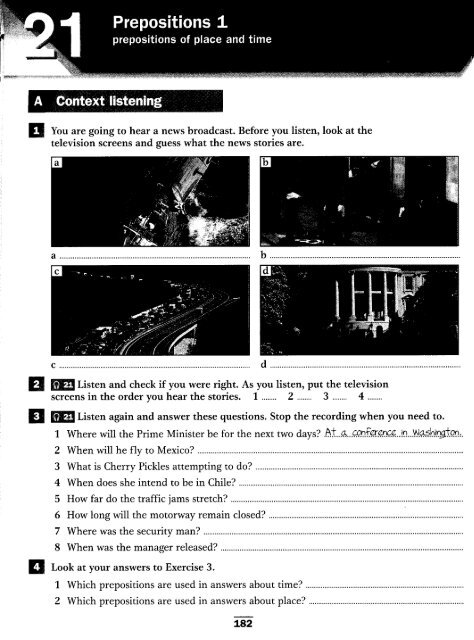
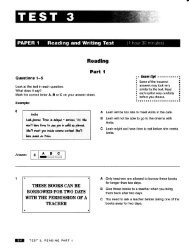
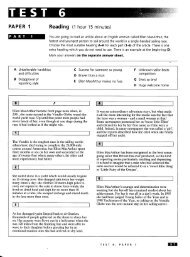
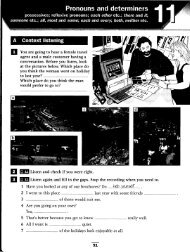
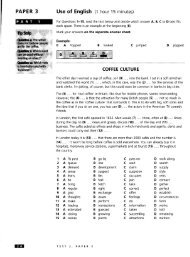
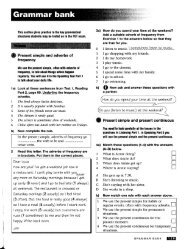
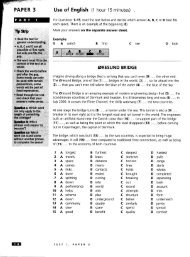
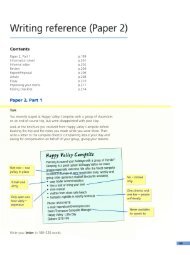

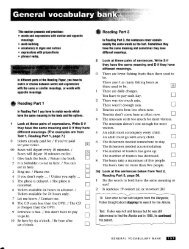
![T]NIT 9 A new look](https://img.yumpu.com/40125756/1/190x248/tnit-9-a-new-look.jpg?quality=85)
